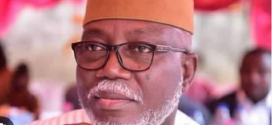CourtesyVanguard
A major controversy appears to have surrounded the official trip of President Mohammadu Buhari to China as the presidency and ministry of finance gave conflicting information on the agenda for the meetings between Nigerian government and Chinese officials currently going on in Beijing, China. The spokesman for the presidency, Mr. Femi Adesina, had told Reuters on Wednesday last week that key on the agenda of the presidential visit was a loan agreement which he said the Nigerian president will sign during the visit, but a top official of the finance ministry said no such loan deal would be signed during the visit. In the Reuters report Adesina was quoted to have, however, declined to disclose the amount involved in the loan deal until the signing day, adding that there would also be some bilateral agreements between the country to be signed during the meeting. The report also indicated that the amount could be in the region of USD2.0 billion. However, a source close to the minister of finance, Mrs. Kemi Adeosun, told Vanguard that the minister is not aware of any such loan deal with China adding that no such deal would be signed by the president during the visit. In its place, the ministry said Nigeria is considering selling Chinese Panda bonds to help finance the 2016 budget. Chinese Panda bond is a yuan-denominated debt instrument issued by non-China based institutions and sold on China’s domestic money market to raise funds for projects and businesses outside China. Finance ministry is also looking at selling Eurobonds as part of government’s international arrangements for the 2016 budget deficit funding of about N2.2 trillion. On borrowings for the budget funding the minister of finance, Mrs. Kemi Adeosun, had said that in addition to the above funding plans the government was looking at borrowing, first from multilateral agencies. In her words, ‘‘our borrowing policy will remain conservative and will see us access the lowest available funds, hence our decision to approach multilateral agencies in the first instance, for budget support at concessional rates as low as 1.5% per annum. ‘‘We have also secured commitments from Export Credit Agencies that are tied to specific capital projects including key initiatives in power, transport and other infrastructure, and at semi-concessional rates. ‘‘The balance will be sourced commercially to create a blended cost of capital that’s as low as possible. ‘‘Borrowing is not our primary focus. Increasing our Internally Generated Revenue is critical because it is sustainable; and because much of the funds collected went unremitted to Government – something we are tackling now. ‘‘Our Revenue Team holds daily
 Hottestgistnaija.com
Hottestgistnaija.com




